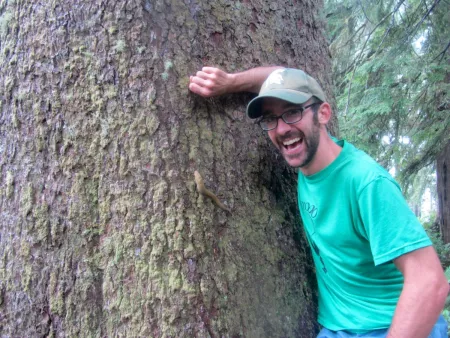Name: Quentin Read
PhD: Ecology and Evolutionary Biology, University of Tennessee
Hometown: Durham, North Carolina
SESYNC Project: Food Life-Cycle Assessments
How would you describe your primary field of study?
Community and spatial ecology
What are the broad questions you are interested in studying?
The questions that drive my research are: What drives variation in biodiversity across scales of space and time, and how are human activities affecting biodiversity and ecosystem functioning?
What inspired you to choose this field of study?
My research is motivated by a fascination with the diversity of the natural world and concern with preserving that diversity. Natural systems are so complex and unpredictable that only complex data and methods of analysis allow us to really capture and describe all the connections in those systems and predict the outcome of change to those systems. The picture only gets more complicated when we also take social and human systems into consideration. I find that an exciting challenge.
Can you briefly describe your proposed SESYNC postdoctoral project?
At SESYNC, I will be working on quantifying food waste and its ecological and environmental impacts across the supply chain within the United States. Waste produced by producing, transporting, selling, and consuming food is an enormous problem, but one that numerous stakeholders have an incentive to reduce. However, many of the previous efforts to quantify food waste have not provided adequate spatial resolution to fully address the problem and to accurately predict the outcomes of different proposed waste-reduction interventions. Furthermore, people have usually thought of food waste strictly in terms of inputs and outputs, and impacts on biodiversity and ecosystem function haven't often been considered. I am going to be building a model of the food supply chain in the United States, accounting for all the waste generated at each step, from crop production to transport to retail to the consumer. The questions I hope to answer are:
- Where and at what step in the supply chain is food in the USA wasted?
- Where and when does food waste have the greatest impacts on the environment, including on biodiversity?
- What proposed interventions will reduce food waste and its environmental/ecological impacts the most, relative to their costs?
Why is SESYNC the right place to undertake this research?
Through SESYNC, I will be connected with a group of researchers from a wide variety of backgrounds, including government, industry, and nonprofits. For an issue like the food system that cuts across every dimension of society, having that kind of varied expertise is really crucial. This will be the first time I've had the opportunity to be part of such a diverse team and I am looking forward to learning a lot from them and hopefully sharing my expertise. I think SESYNC is an ideal place to apply the ecological theories and methods of analysis I've learned in my career to the food system.
What are you reading right now?
I'm working on a couple of books on statistical learning methods. For pleasure, I'm reading Annapurna, the story of the first mountaineering expedition to summit an 8,000-meter peak!
